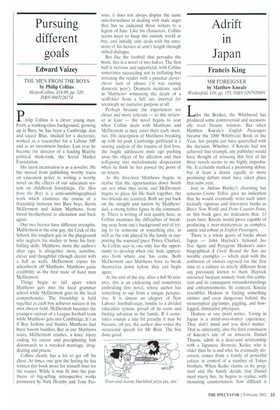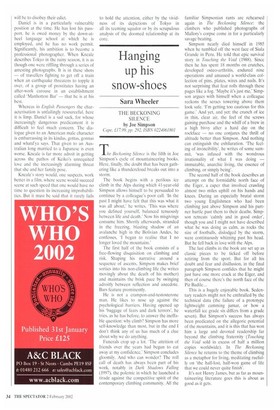Adrift in Japan
Francis King
MR FOREIGNER by Matthew Kneale
Weidenfeld, £10, pp. 155, ISBN 0297828991
Like the Booker, the Whitbread has produced some controversial and occasionally even bizarre winners. But when Matthew Kneale's English Passengers became the 2000 Whitbread Book of the Year, few people can have quarrelled with the decision. Whether, if Kneale had not achieved that triumph, any publisher would have thought of reissuing this first of his three novels seems to me highly improbable. It certainly marked a promising debut: but at least a dozen equally or more promising debuts must have taken place that same year.
Just as Aldous Huxley's charming but tenuous Crome Yellow gave no indication that he would eventually write such intellectually vigorous and innovative books as Brave New World and Point Counter Point, so this book gave no indication that, 13 years later, Kneale would prove capable of producing a near-masterpiece as complex, ample and robust as English Passengers.
There is a whole genre of books about Japan — John Haylock's fictional See You Again and Peregrine Hodson's autobiographical A Circle Round the Sun are notable examples — which deal with the confusion of visitors exposed for the first time to a culture so utterly different from any previously known to them. Haylock extracted buoyant comedy from this confusion and its consequent misunderstandings and embarrassments. In contrast, Kneale resembles Hodson in finding something sinister and even dangerous behind the stereotypical gig-lamps, giggling, and bowlegged, diminutive physiques.
Hodson at one point writes, 'Living in Japan is a mind-over-matter experience. They don't mind and you don't matter.' That is, inherently, also the final conclusion of Kneale's tale of an innocent, Daniel Thayne, adrift in a dead-end relationship with a Japanese divorcée, Keiko, who is older than he is and who, he eventually discovers, comes from a family of powerful yakuza in control of a number of Tokyo brothels. When Keiko claims to be pregnant and the family decide that Daniel must marry her, he begins to realise, with mounting consternation, how difficult it will be to disobey their edict.
Daniel is in a particularly vulnerable position at the time. He has lost his passport, he is owed money by the down-atheel language school at which he is employed, and he has no work permit Significantly, his ambition is to become a professional photographer. When Kneale describes Tokyo in the rainy season, it is as though one were riffling through a series of arresting photographs. It is in these shots — of travellers fighting to get off a train when an earthquake threatens to topple it over, of a group of prostitutes having an after-work carouse in an establishment called Manhotton Bar' — that he is at his best.
Whereas in English Passengers the characterisation is unfailingly resourceful, here it is limp. Daniel is a sad sack, for whose increasingly dangerous predicament it is difficult to feel much concern. The dialogue given to an American male character is embarrassing in its kindas, gottas, gonnas and whatd'ya says. That given to an Australian long married to a Japanese is even worse. Kneale is far more adroit in getting across the pathos of Keiko's unrequited love and the increasingly alarming threat that she and her family pose.
Kneale's story would, one suspects, work better in a film, where scene would succeed scene at such speed that one would have no time to question its increasing improbabilities. But it must be said that it rarely fails to hold the attention, either by the vividness of its depictions of Tokyo in all its teeming squalor or by its scrupulous analysis of the doomed relationship at its core.































































 Previous page
Previous page